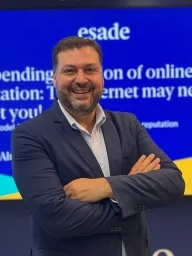“The future of work is hybrid and flexible,” declares Cisco Spain’s General Manager during a new Matins Esade session
“The future of work is hybrid and flexible. Having to be physically present is over, turning work into an activity and not a place. This will foment investment in technology and requires greater trust in employees,” explained Esade alumnus and General Manager of Cisco Spain, Andreu Vilamitjana, in a new Matins Esade session.
“The pandemic has been systemic, and it has changed the way we interact with others, work, study... as well as the role companies and governments play. During the first few months of the pandemic, work and studies, amongst other things, shifted to the digital arena,” indicated the guest speaker, adding that “working remotely has been adopted on a massive scale, and, currently, nine out of ten people want to be able to choose between working from home or the office as well as how they manage their time.”
The General Manager of Cisco Spain, one of the pioneering and crucial companies in the history of internet, thinks that, in this pandemic, “individual responsibility is what’s important”, describing some of the initiatives Cisco Spain has launched since March of last year. In less than 48 hours, the firm implemented a company project to facilitate distance learning, ensure the continuation of public services and facilitate teleworking. It also collaborated with the implementation of network technology in field hospitals. Amongst other initiatives, Cisco Spain employees donated videoconferencing equipment to retirement homes to ensure that residents could communicate with their families.
“Networks, automation and security are the keys that define the new norm.” According to this executive, “96% of CIOs (Chief Information Officers) in big companies believe that transforming their organisations now includes four strategic priorities: re-imagining their applications, which define the relation between the brand and their clients and the way in which goods and services are consumed; protecting their data, something which is now critical; promoting collaborative work; and transforming their infrastructures, automating and managing their networks in real time.”
Technology is already essential
“Between 10 and 15% of GDP will be invested in technology. Companies demand new digital platforms that are less complex and offer greater security”, highlighted Vilamitjana, who believes that “the recovery will come about for everyone naturally” and that connectivity will be possible in rural areas with dwindling populations, the so-called ‘empty Spain’, one of the biggest challenges.
In this respect, Cisco Spain’s General Manager indicated that, “we can’t forget about digital competencies” and that is why nearly 300,000 people have taken part in Cisco Networking Academy courses related to digital skills, adding that the company “has offered it to the government as an educational platform for people at risk of social exclusion.”
“Digitalisation will accelerate the recovery. Some have said that Spain did not take advantage of the industrial revolution at the time. Will the same thing happen with the digital transformation?” With his question, the executive ended his speech in this new Matins Esade session. Matins Esade represent a space for reflection on business reality, organised by Esade Alumni and held at Esade, inviting executives from well-known companies to explain their views of their respective industries and the companies they lead.





